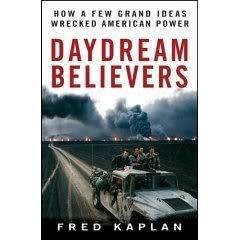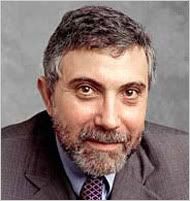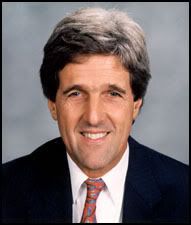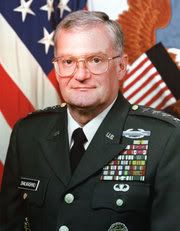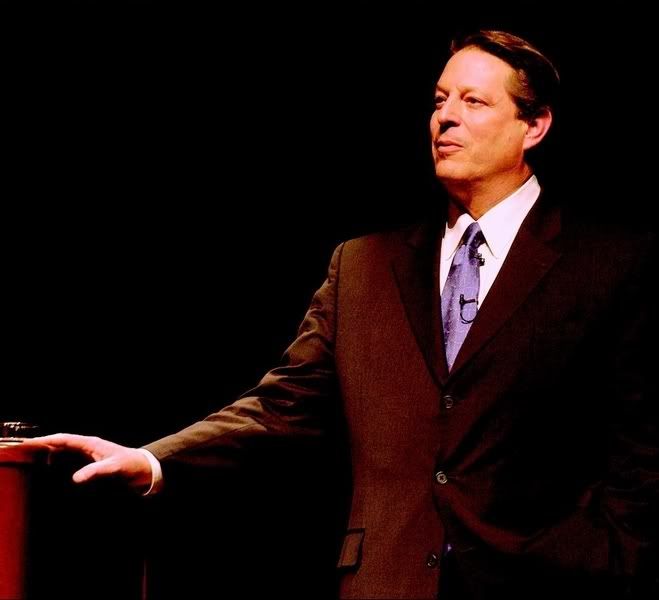
What is the driving force behind the progressive blogosphere’s relentless pursuit of truth? Where does it come from and why the intensity? Well, for a lot of us President Bush’s cheap imitation of Tom Cruz in
Top Gun four years ago today is a powerful symbol.
There is no topic more sobering for a nation than war. Yet, on May 1, 2003, our adolescent President dressed up as a fighter pilot and made a spectacle of declaring “Mission Accomplished.” The corporate media, MSNBC's Chris Mathews especially, opted to uncritically praise President Bush’s tawdry exploitation of symbolism. As a patriotic American, I was embarrassed by my President’s behavior that day and deeply offended by bastions of the mainstream media such as Chris Mathews and CNN's Wolf Blitzer.
Unlike a real news organization such as Knight Rider, much of the mainstream media ignored that the American intelligence bureaucracy had considerable doubts about Iraq’s possession of weapons of mass destruction. Then they compounded their sins by celebrating President Bush’s cynical use of the symbols of war such as a fighter pilot’s uniform and a navy carrier. A day that will live in infamy as an example of the media’s disgraceful failures the previous six years and a reminder of why the elitists on your television screens have blood on their hands.
Media Matters has provided detailed transcripts from some of the most egregious coverage from that day which I pasted below.
*******************************************************************************Chief among the cheerleaders was MSNBC's
Chris Matthews. On the May 1, 2003, edition of
Hardball, Matthews was joined in his effusive praise of Bush by right-wing pundit
Ann Coulter and "Democrat"
Pat Caddell. Former U.S. Rep. Robert K. Dornan (R-CA) also appeared on the program.:
MATTHEWS: What's the importance of the president's amazing display of leadership tonight?
[...]
MATTHEWS: What do you make of the actual visual that people will see on TV and probably, as you know, as well as I, will remember a lot longer than words spoken tonight? And that's the president looking very much like a jet, you know, a high-flying jet star. A guy who is a jet pilot. Has been in the past when he was younger, obviously. What does that image mean to the American people, a guy who can actually get into a supersonic plane and actually fly in an unpressurized cabin like an actual jet pilot?
[...]
MATTHEWS: Do you think this role, and I want to talk politically [...], the president deserves everything he's doing tonight in terms of his leadership. He won the war. He was an effective commander. Everybody recognizes that, I believe, except a few critics. Do you think he is defining the office of the presidency, at least for this time, as basically that of commander in chief? That [...] if you're going to run against him, you'd better be ready to take [that] away from him.
[...]
MATTHEWS: Let me ask you, Bob Dornan, you were a congressman all those years. Here's a president who's really nonverbal. He's like Eisenhower. He looks great in a military uniform. He looks great in that cowboy costume he wears when he goes West. I remember him standing at that fence with Colin Powell. Was [that] the best picture in the 2000 campaign?
[...]
MATTHEWS: Ann Coulter, you're the first to speak tonight on the buzz. The president's performance tonight, redolent of the best of Reagan -- what do you think?
COULTER: It's stunning. It's amazing. I think it's huge. I mean, he's landing on a boat at 150 miles per hour. It's tremendous. It's hard to imagine any Democrat being able to do that. And it doesn't matter if Democrats try to ridicule it. It's stunning, and it speaks for itself.
MATTHEWS: Pat Caddell, the president's performance tonight on television, his arrival on ship?
CADDELL: Well, first of all, Chris, the -- I think that -- you know, I was -- when I first heard about it, I was kind of annoyed. It sounded like the kind of PR stunt that Bill Clinton would pull. But and then I saw it. And you know, there's a real -- there's a real affection between him and the troops.
[...]
MATTHEWS: The president there -- look at this guy! We're watching him. He looks like he flew the plane. He only flew it as a passenger, but he's flown --
CADDELL: He looks like a fighter pilot.
MATTHEWS: He looks for real. What is it about the commander in chief role, the hat that he does wear, that makes him -- I mean, he seems like -- he didn't fight in a war, but he looks like he does.
CADDELL: Yes. It's a -- I don't know. You know, it's an internal thing. I don't know if you can put it into words. [...] You can see it with him and the troops, the ease with which he talks to them. I was amazed by that, frankly, because as I said, I was originally appalled, particularly when I heard he was going in an F-18. But -- on there -- but the -- but you know, that was --
MATTHEWS: Look at this guy!
CADDELL: -- was hard not to be moved by their reaction to him and his reaction to them and --
MATTHEWS: You know, Ann --
CADDELL: -- you know, they -- it's a quality. It's an innate quality. It's a real quality.
MATTHEWS: I know. I think you're right.
Later that day, on MSNBC's Countdown with Keith Olbermann, Matthews said:
MATTHEWS: We're proud of our president. Americans love having a guy as president, a guy who has a little swagger, who's physical, who's not a complicated guy like [former President Bill] Clinton or even like [former Democratic presidential candidates Michael] Dukakis or [Walter] Mondale, all those guys, [George] McGovern. They want a guy who's president. Women like a guy who's president. Check it out. The women like this war. I think we like having a hero as our president. It's simple. We're not like the Brits. We don't want an indoor prime minister type, or the Danes or the Dutch or the Italians, or a [Russian Federation President Vladimir] Putin. Can you imagine Putin getting elected here? We want a guy as president.
On the May 7, 2003, edition of Hardball, Matthews asked former Nixon administration official G. Gordon Liddy what he thought of the response to Bush's landing on the Abraham Lincoln. Looking at the footage, Liddy commented that Bush's flight suit made "the best of his manly characteristic." From the May 7 Hardball:
MATTHEWS: What do you make of this broadside against the USS Abraham Lincoln and its chief visitor last week?
LIDDY: Well, I -- in the first place, I think it's envy. I mean, after all, Al Gore had to go get some woman to tell him how to be a man. And here comes George Bush. You know, he's in his flight suit, he's striding across the deck, and he's wearing his parachute harness, you know -- and I've worn those because I parachute -- and it makes the best of his manly characteristic. You go run those -- run that stuff again of him walking across there with the parachute. He has just won every woman's vote in the United States of America. You know, all those women who say size doesn't count -- they're all liars. Check that out. I hope the Democrats keep ratting on him and all of this stuff so that they keep showing that tape.
MATTHEWS: You know, it's funny. I shouldn't talk about ratings. I don't always pay attention to them, but last night was a riot because, at the very time [U.S. Rep.] Henry Waxman [D-CA] was on -- and I do respect him on legislative issues -- he was on blasting away, and these pictures were showing last night, and everybody's tuning in to see these pictures again.
Various media figures hyped Bush's National Guard experience but made no mention of evidence that emerged during the 2000 presidential campaign that Bush may have received special treatment in getting into TANG and during his tenure. On the May 1, 2003, edition of CNN's Wolf Blitzer Reports, Blitzer noted that jets like the F/A-18 Hornet "helped win the war in Iraq" and twice commented on Bush's TANG background -- at one point calling Bush a "one-time Fighter Dog." From the May 1 edition of Wolf Blitzer Reports:
BLITZER: There was a riskier landing that the president wanted to make. The Secret Service, though, just wouldn't let the commander in chief ride in an F/A-18 strike fighter. But CNN's Kyra Phillips will be doing just that in a matter of only a few minutes. She's in the cockpit of this F/A-18 Hornet. Right now, Navy jets like this one, of course, helped win the war in Iraq. Now, they're headed home. We'll talk with Kyra as soon as she catapults off the deck of the USS Abraham Lincoln. That's coming up.
A little bit of history and a lot of drama today when President Bush became the first commander in chief to make a tailhook landing on an aircraft carrier. A one-time Fighter Dog himself in the Air National Guard, the president flew in the co-pilot seat with a trip to the USS Abraham Lincoln. And he then mingled with the pilots and the crew members of the carrier on its way back from a deployment which covered the war in Iraq and before that, the war in Afghanistan. From that same deck tonight, the president will make more history. He'll deliver a major address to the nation.
[...]
BLITZER: And the president clearly pleased by his own landing aboard the aircraft carrier Abraham Lincoln.
[...]
And as we mentioned, President Bush is no stranger to military aircraft. He flew F-102 fighter jets in the Texas Air National Guard. He joined at the height of the Vietnam War but was never sent overseas and never saw combat. There's a picture of the young George W. Bush in the Texas Air National Guard.
On the May 1 edition of CNBC's The News with Brian Williams, Williams, now anchor of NBC's Nightly News, said of Bush:
WILLIAMS: And two immutable truths about the president that the Democrats can't change: He's a youthful guy. He looked terrific and full of energy in a flight suit. He is a former pilot, so it's not a foreign art farm -- art form to him. Not all presidents could have pulled this scene off today.
On the May 1 edition of Fox News' On the Record with Greta van Sustern, correspondent Jon Scott reported:
SCOTT: Greta, the president made just about as grand an entrance tonight as the White House could have asked for. He came in aboard an S-3B Viking. That's a sort of a workhorse of the carrier fleet, an aircraft that is sometimes used for aerial refueling. It can also drop targeted and non-targeted bombs, the so-called dumb bombs. It can do a little bit of everything, and today it brought some very important cargo, namely the president of the United States, the first time ever that a sitting president has landed on a moving aircraft carrier.
Now, of course, President Bush flew fighters in the Air National Guard, but no pilot, no matter how experienced, can land on an aircraft carrier first time out. The president did take the stick for a short time during his flight, but he let another pilot handle the landing. Now, he -- when he got here he was absolutely mobbed by the 200 or so crew members who are normally on deck during flight ops, as they call them. The people in the multicolored jerseys reached out for a handshake, a photo, anything they could get of this president. One observer here tonight said it was like the Beatles climbed out of that plane, and that's very much what it looked like from here.
On the May 1 edition of Fox News' Special Report with Brit Hume, White House correspondent Wendell Goler reported:
GOLER: With a tailhook landing on the aircraft carrier Abraham Lincoln, President George W. Bush made history in advance of a historic speech to the nation in which he'll declare the war in Iraq is all but over. Mr. Bush traded his suit and tie for a flight suit and took a 20-minute flight to the ship during which he briefly called on his skills as a pilot in the National Guard.
[...]
HUME: Wendell, the president said "Yes, I flew it," right? And you said he did. How much flying did he actually do today?
GOLER: Brit, the president says he flew the plane about a third of the way from North Island Naval Air Station to the carrier Lincoln. He says the pilot asked him if he wanted to do some maneuvers, but he flew it mostly in a straight line. He says he sure misses flying but that the S-3B Viking is a lot more sophisticated than the planes he flew during his time in the Air National Guard.
The print media joined in the collective swoon the following day. From a May 2, 2003, article in The New York Times by staff writer David E. Sanger:
But within minutes Mr. Bush emerged for the kind of photographs that other politicians can only dream about. He hopped out of the plane with a helmet tucked under his arm and walked across the flight deck with a swagger that seemed to suggest he had seen Top Gun. Clearly in his element, he was swarmed by cheering members of the Lincoln's crew.
Even in a White House that prides itself on its mastery of political staging, Mr. Bush's arrival on board the Lincoln was a first of many kinds.
Never before has a president landed aboard a carrier at sea, much less taken the controls of the aircraft. His decision to sleep aboard the ship this evening in the captain's quarters conjured images of the presidency at sea not seen since Franklin D. Roosevelt used to sail to summit meetings.
Mr. Bush was clearly reliving his days as a pilot in the Texas Air National Guard, more than three decades ago. "I miss flying, I can tell you that," he told reporters who bumped into him as he moved around the ship.
Washington Post staff writer Karen DeYoung reported on May 2, 2003:
Bush, who had taken off his helmet and thus avoided photographic comparisons to presidential candidate Michael S. Dukakis's unfortunate episode with a tank helmet during 1988 campaign, jumped down in full flight regalia, a smile splitting his face. The Navy had planned an official greeting, with Bush being piped aboard and walking through two rows of "sideboys" saluting him -- a tradition that dates from the days when visiting officers were hauled up the side of the ship in a boatswain's chair.
Bush ignored it all, swaggering forward and pumping hands with everybody in sight before they could salute. "Here's a man with a birthday," he yelled at a television cameraman as he swung his arm around a sailor. "Put him on C-SPAN." For once, there were no security concerns to keep Bush from pressing flesh, and he made the most of it, hugging and patting everyone on the back -- from the greasy flight deck crew to F-18 pilots waiting to fly home this afternoon.
"Great job, great job," he kept saying. "I flew it," he shouted back to a reporter's shouted question about his flight. "Yeah, of course I liked it. It was fantastic."
Later, Bush explained that he had taken the controls from the pilot, Cmdr. John "Skip" Lussier, for about a third of the 15-minute flight at 360 knots, but had just steered during the "straight" parts. It was, he said, "much more sophisticated" than the jets he used to fly during his tour in the National Guard. Bush had a briefing from the Air Wing Commander and crew members who described their personal experiences flying in combat, watched gun camera footage and heard a battle damage assessment.
The weekend news programs brought even more praise for Bush's performance. On the May 4, 2003, edition of CBS' Face the Nation, host Bob Schieffer and Time columnist Joe Klein had this to say:
SCHIEFFER: As far as I'm concerned, that was one of the great pictures of all time. And if you're a political consultant, you can just see campaign commercial written all over the pictures of George Bush.
KLEIN: Well, that was probably the coolest presidential image since Bill Pullman played the jet fighter pilot in the movie Independence Day. That was the first thing that came to mind for me. And it just shows you how high a mountain these Democrats are going to have to climb. You compare that image, which everybody across the world saw, with this debate last night where you have nine people on a stage and it doesn't air until 11:30 at night, up against Saturday Night Live, and you see what a major, major struggle the Democrats are going to have to try and beat a popular incumbent president.
On the May 4, 2003, edition of Fox Broadcasting Co.'s Fox News Sunday, Fox News Washington bureau managing editor Brit Hume recounted Bush's bravery:
HUME: But this was risky business. You know, there's grease and oil on the decks of those aircraft carriers. The wind's blowing. All kinds of stuff could have gone wrong. It didn't, he carried it off. Somebody, perhaps he, obviously, believed he could. But this was no slam dunk.
On the May 3, 2003, edition of CNN's The Capital Gang, then-Time columnist Margaret Carlson spoke of the "stirring tableau":
CARLSON: A hurricane couldn't have interfered with that particular parade. It was so well done, and even though we knew that everything was choreographed down to, you know, catching that fourth hook on the ship, it was still a pretty stirring tableau. Cecil B. DeMille couldn't have been done better. And even though you know there's no Santa Claus, Christmas is still great, as it was with that particular moment.
And appearing on the May 4, 2003, edition of CNN's Reliable Sources, syndicated radio host Laura Ingraham discussed her reaction:
INGRAHAM: Speaking as a woman, and listening to the women who called into my radio show, seeing President Bush get out of that plane, carrying his helmet, he is a real man. He stands by his word. That was a very powerful moment.
